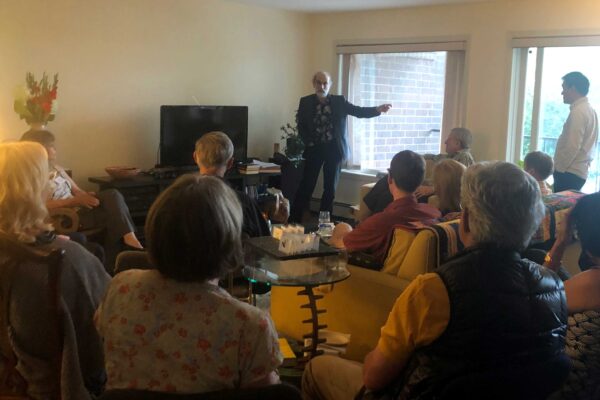By Communications Intern Jenny Portis
We tend to view foreign interference in our elections as some sort of attack or abuse. But an internationally known security expert says this online influence is more nuanced than we think.
Privacy specialist and public interest technologist Bruce Schneier, who is widely known as a “security guru,” said that foreign governments spread misinformation through savvy manipulation of how these platforms are intended to work. He spoke at a recent event for Liberty’s Champions donors.
These governments turn shared public knowledge, trusted facts about things like mechanisms of government or how the judiciary works, into contested knowledge.
They introduce doubt in our political institutions — Was the 2016 election fair? Can we trust the Census? — and insidiously erode our democratic stability from the inside.
This is the kind of information we turn to when it comes time to vote, which involves two different processes: Voting itself, and deciding who to vote for in the first place. Both have weaknesses. Casting a ballot involves a relatively informal and insecure system of vote tabulation, combined with the lack of a federal agency with the power to ensure the election is free and accurate.
But the political psychology that takes place before a voter even enters the booth on election day is what’s been dominating headlines for the past few years.
When we decide who to vote for, we rely on the web and social media for much of that information. And that, of course, is where foreign governments have been distorting these facts and spreading misinformation.
However, we attribute too much brainwashing power to the content that foreign governments introduce online, Schneier said.
“It’s not that the internet turns people into Nazis,” he said. “It’s that the internet turns Nazis into voters.”
Rather than reshaping individuals’ political opinions, the rising presence of this sort of content enables people who are susceptible to those ideas to find each other, congregate and mobilize.
Schneier emphasized the difficulty in managing the nearly intangible methods of foreign election interference.
“It’s very hard to outlaw misinformation without losing a lot of things that we care about,” he said. What makes it so challenging is that the behaviors themselves can’t be made wrong: Everyone has the right to be an internet troll if they so desire.
Looking to the future, our government’s tactics for defending against foreign interference are evolving. Federal agencies like the NSA and the FBI were much more effective at protecting election security in 2018 than in 2016, Schneier said. But the attackers are learning and adapting too.
While this may sound alarming, Schneier said that much of the actual data on election security shows that concerns are generally overblown. The U.S. government’s democratic integrity is not on its deathbed.
We need not issue a cry of panic, but instead, we must be cognizant of the fact that foreign election interference is real — and it’s much more subtle than we think.

